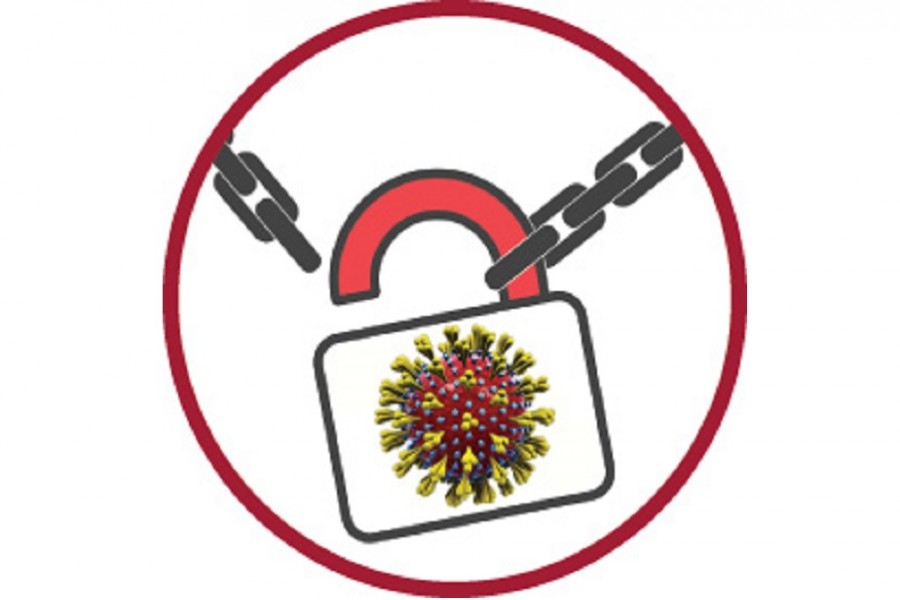The government has finally gone for a widespread lockdown. The aim is containment of the fast spreading Covid-19 virus. A total of 45 areas in capital Dhaka, 11 in Chattogramand some upazilas in Narsingdi,Narayanganj and Gazipur have been listed as red zones. Complete lockdowns are set to be enforced in these areas.
Lockdown is far more stringent than shutdown. After the over-two-month shutdown across the country was lifted on May 31, lot of people noticed in the decision the signs of a wartime all-clear. The post-shutdown period prompted many to feel relieved on the ground that they could now move freely in the city. All offices and businesses resumed their activities in phases. Roads began to be filled with different modes of transport. Along with these, the capital also watched the slow return of the stiflingly crowded Dhaka. It added to the already prevalent Covid-19 dread.
What may have prompted the government to declare complete lockdowns in some areas is the unabated rise in the number of novel coronavirus cases and fatalities. The traditionally busy neighbourhoods in Dhaka were found chockablock with seemingly nonchalant crowds and myriad types of transport. Many people were seen without masks, some hanging those loosely around their neck- like sunglasses tilted up to stylist people's forehead. Apparently, these people were completely free of the fear of Covid-19 virus. Few of them took seriously the nonstop warnings and exhortations from the authorities: Not wearing masks while outside is a punishable offence. And that complying with physical distance greatly reduces the chances of being infected with novel coronavirus. These words carried little meaning for many.
The post-shutdown Dhaka and a few other cities were scenes of revolting non-compliances. More or less the similar spectacles kept unfolding in almost every busy area of the country. Dhaka topped the list, with a few of its localities already declared as being under lockdown with red zone markings.
A fortnight into the shutdown's withdrawal, the capital could not be told from its traditional frenetic character. As days passed by, the city had found itself in a neo-normal situation.The prevailing scenarios, veritably, spoke of a muddled-up view. Compared to the other large cities elsewhere in the world, which have lately been declared open, Dhaka didn't show the signs that it has ever experienced a corona outbreak. The urban scenes were business as usual. The residents gave the look of a lot with their eyes fixed on days of a renewed start of life. To many the nightmares were over; it was time to usher in the days of renewal in every sector of social and national lives. Unfortunately, given the ground reality, those were utopian thoughts.
Unlike Dhaka, which had been under a long shutdown, the overseas cities are found wary and prepared for unwarranted eventualities despite their being under strict lockdowns not long ago. The residents are still highly mindful of maintaining physical distance outside - the venues ranging from restaurants, parks, esplanades to lakesides. The authorities in charge of Dhaka and the other cities, appear to have become oblivious to a chilling truth related to Covid-19. Few have ever given a serious thought to the epidemiologists' repeated warnings: The vulnerability of specific places to be stricken by the pandemic for the second time. In its re-appearance the virus might assume a completely new look and character.
The spectre of the Covid-19 pandemic continues to loom over Dhaka. In spite of it, the city tries to become 'normal' with every passing day. But it's failing miserably. It's because its inhabitants are incorrigibly averse to developing awareness regarding health and hygiene. There are none to restrain the people's reckless behaviours. With the mandatory requirement of social and physical distance long thrown to the wind, corona-free urban life may remain elusive to them for some more time. One may cite the instance of the opening of the large shopping malls. The reckless way the shoppers have been seen swarm on the malls was interpreted by many experts as a pointer to terrible times ahead. In the post-shutdown initial days, the capital's residents were found cautious in their movements. The roads were mostly free of vehicles - the pedestrians on footpaths walking briskly with their masks on. Despite remaining open, the owners of the roadside vendors' shops would look up eagerly to people approaching their displays of merchandise. Those days have been made to vanish by the bouts of people's recklessness and apathy.
Pandemics are not too unpredictable or inscrutable. Humans have been living through their outbreaks across countries and continents since the 14th century. But they were limited mainly to the European continent. Till the early 20th century, over a million had died from the pandemics of bubonic plague, different kinds offlu and cholera. Bouts of plague and cholera epidemics also afflicted the Indian Sub-continent in the 19th century.
Covid-19 has proved itself a massive pandemic, killing nearly half a million people in the last four months as it marched in all directions of the earth. The pandemic has ravaged approximately 70 per cent of the planet leaving only the island nations and territories and highly isolated countries unaffected. On many counts, this dreadful pandemic has been dubbed the first of its kind since the biblical times. A dominant aspect of the global scourge is dozens of economic giants among the modern nations have apparently been humbled by it. Moreover, it has left the global socio-political and economic sectors in disarray.
The recent talks of learning to adapt to the pandemic-time neo-reality might turn out to be a stopgap relief of sorts. With an effective vaccine still elusive and researchers desperately trying to home in on the true character of the virus, the pandemic is feared to stay alive in one form or another in some corners of the world. There are many dreadful news awaiting less developed countries like Bangladesh, where the pandemic has just started peaking. Few options are open to them except stringent lockdowns and aggressive campaigns of awareness-building.


